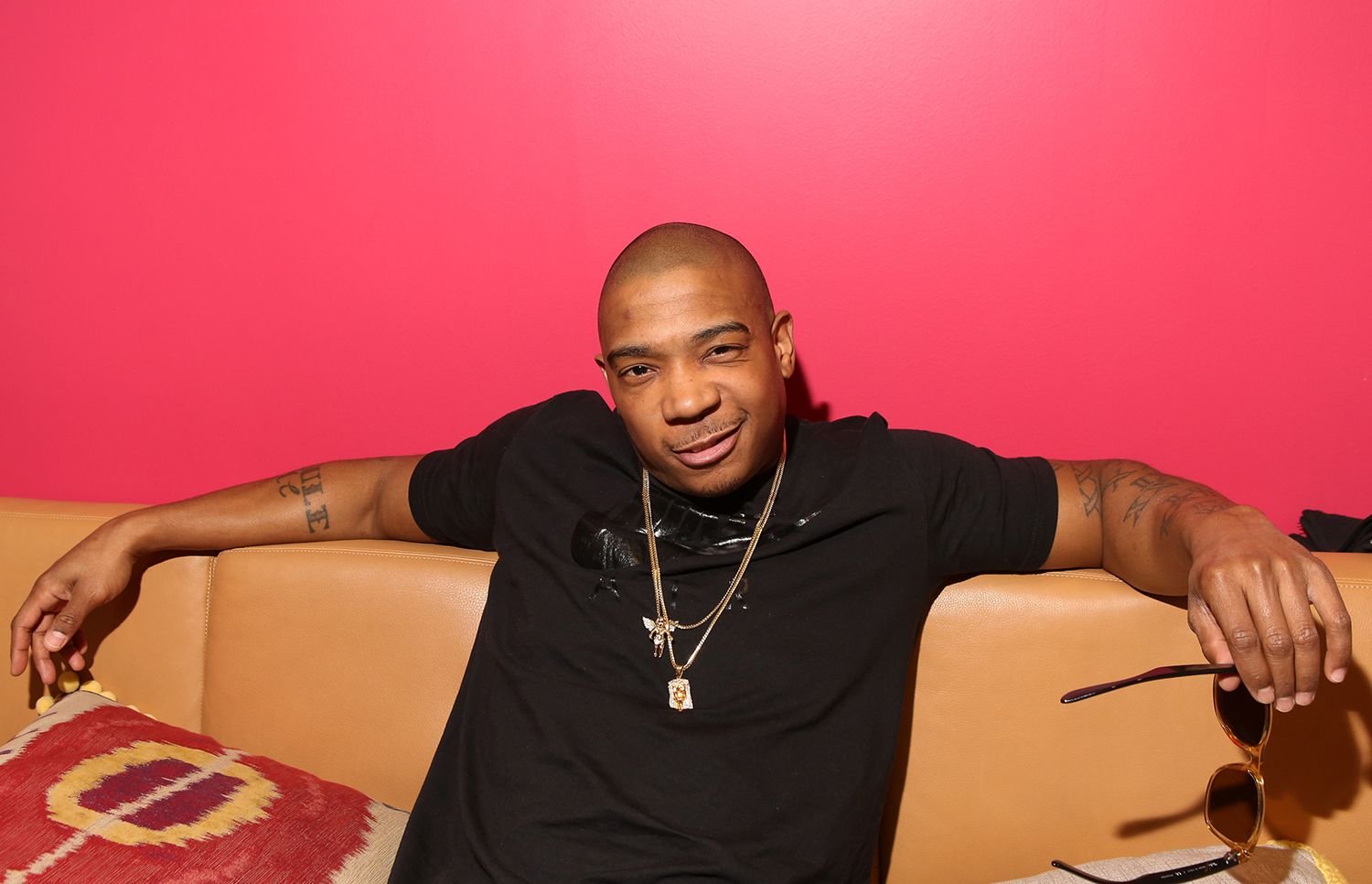The Impact of Faith: Ja Rule’s Journey from Jehovah’s Witness to Hip-Hop Icon

Introduction
Jeffrey Atkins, better known by his stage name Ja Rule, emerged from a background steeped in the doctrines of Jehovah’s Witnesses. Born on February 29, 1976, in Queens, New York, Ja Rule’s early life was influenced significantly by his mother, a devoted member of the faith. The principles of this religion shaped his formative years, imparting a strong moral framework and a sense of community. However, the tenets of Jehovah’s Witnesses often clashed with the realities of life outside their strict boundaries, leading to tensions within his family dynamics.
Raised in a household that adhered to the rigid rules of the Jehovah’s Witnesses, Ja Rule experienced both the security and restrictions that such an upbringing entails. While he benefited from a close-knit family environment and spiritual education, the departure of his mother from the faith introduced complexities into his early life. The dissonance between his family’s expectations and the pressures from the outside world often left him in a state of internal conflict. This duality would later manifest in his music, highlighting the tension between his faith and the allure of the hip-hop lifestyle.
As a young man, Ja Rule navigated the challenges of adolescence within the context of his upbringing. The contrast between the strict teachings of Jehovah’s Witnesses and the vibrant yet tumultuous culture of hip-hop proved to be a pivotal point in his development. His personal experiences fed into his artistic expression, providing a unique lens through which he examined themes of faith, identity, and the struggles of reconciling personal beliefs with societal influences. This journey from a lifestyle rooted in religious observance to becoming a hip-hop icon encapsulates the complex interplay between faith and self-discovery.
Early Life in a Jehovah’s Witness Household
Ja Rule, born Jeffrey Atkins, was raised in a household that adhered to the tenets of the Jehovah’s Witness faith. This upbringing played a crucial role in shaping his values, beliefs, and worldview. Jehovah’s Witnesses are known for their distinct lifestyle, which often includes strict adherence to the Bible, active participation in community services, and avoidance of practices deemed incompatible with their beliefs, such as celebrating holidays and birthdays. Ja Rule experienced these practices firsthand, and they significantly impacted his early development.
Growing up in a Jehovah’s Witness household, Ja Rule was subjected to specific guidelines that dictated various aspects of daily life. This included regular attendance at meetings and assemblies, engaging in evangelistic activities, and avoiding secular influences that could compromise his faith. His family’s strong ties to the congregation fostered a sense of community but also imposed a rigid structure that limited interactions with peers outside the faith. Such restrictions influenced his social life, creating a duality between the teachings of his faith and the realities of the outside world.
The principles instilled in him during his formative years were rooted in discipline, respect for authority, and a strong sense of morality. However, as he transitioned into adolescence, the conflict began to surface between his upbringing and the allure of the hip-hop culture that permeated his environment. The creative expressions found in music provided him with an avenue to explore his identity, often clashing with the values imposed by his faith. This internal struggle would become a significant aspect of his narrative as he redefined his path, navigating the realms of both faith and artistry.

The Moment of Departure
Ja Rule, born Jeffrey Atkins, experienced significant changes in his formative years that would ultimately shape his identity as both an artist and an individual. One of the most pivotal moments in his life was the decision by his mother to leave the Jehovah’s Witness community. This decision was not made lightly; it was influenced by various factors, including personal beliefs, social interactions, and the desire for a more conventional upbringing for her children.
Leaving the Jehovah’s Witness community represented a significant shift in their family’s dynamics. The community is known for its strict adherence to doctrine and teachings that guide personal and family life. By stepping away from this structure, Ja Rule’s mother sought not only to provide a different lifestyle for her family but also to grant her children exposure to broader social circles. This exposure would ultimately influence Ja Rule’s artistic expression, allowing him to draw from a diverse range of experiences.
The repercussions of this departure were multifaceted. While leaving the faith may have fostered opportunities for broader integration into society, it also brought challenges such as social ostracism and legal issues, as the Jehovah’s Witness community can be rigid in its views toward those who leave. The family’s transition from a sheltered life to one that embraced a more secular worldview undoubtedly contributed to the complexities of Ja Rule’s upbringing. These experiences are woven into the fabric of his artistry, influencing his lyrical themes and the persona he would eventually adopt in the hip-hop industry.
Thus, the moment of departure marked a crucial turning point in Ja Rule’s life, setting the stage for his evolution as a musician and public figure. It laid the groundwork for both the challenges and opportunities that he would encounter in his journey toward becoming a hip-hop icon.
Strained Family Relationships
Ja Rule, born Jeffrey Atkins, experienced a significant emotional upheaval following his mother’s departure from the Jehovah’s Witness faith. The departure not only marked a pivotal point in his formative years but also strained his relationships within his family. For adherents of the faith, leaving often results in ostracism or a breakdown of familial bonds. As such, Ja Rule’s mother’s exit inadvertently influenced his connections with other family members who remained steadfast in their beliefs.
The impact of her departure can be understood through the lens of the values intertwined with the Jehovah’s Witness community. This religious group places a strong emphasis on familial loyalty and cohesion within the faith. Consequently, his mother’s decision to leave created a rift that alienated her from her son and other family members. This alienation instilled a sense of confusion and disillusionment for Ja Rule, given the community-centric nature of the beliefs he had been raised with.
Furthermore, the separation from his mother did not merely strain their relationship but also affected the dynamics with other relatives. Ja Rule’s remaining family members, who upheld the teachings of Jehovah’s Witnesses, may have felt the need to distance themselves from him, reflecting their unease or disappointment regarding his mother’s exit. As he sought acceptance and understanding in a complex world, he could have felt caught between his mother’s choices and the expectations of his extended family.
This emotional fallout left an indelible mark on Ja Rule’s life, influencing not only his personal well-being but shaping his perspectives on relationships, loyalty, and faith. The complexities of navigating familial loyalty amidst divergent beliefs remain a notable chapter in the narrative of his journey from a young boy enveloped in religious ideals to a prominent figure in hip-hop culture.

Witnessing His Mother’s Pain
Growing up as a Jehovah’s Witness, Ja Rule had a profoundly unique upbringing. Central to his early life were the teachings and values instilled by his mother, a devout member of the faith. However, as he transitioned through adolescence, Ja Rule witnessed the emotional turmoil that arose when his mother chose to leave the Jehovah’s Witness community. This pivotal moment marked a significant shift in his perspective towards faith and spirituality.
The departure from the Jehovah’s Witness faith was not merely a change of belief for his mother; it was accompanied by severe emotional distress. Ja Rule observed the intense conflict within her—a struggle marked by the loss of community, familial ties, and the doctrines she had adhered to for much of her life. The pain manifesting in her day-to-day experiences served as a formative lesson for Ja Rule, revealing a deeper understanding of the consequences that accompany a departure from such a tightly-knit religious group.
These experiences shattered Ja Rule’s initial perceptions about faith, provoking a sense of empathy within him. He recognized that the Jehovah’s Witness community, while providing a structured belief system, could also lead to profound isolation and heartache when one chose to leave. Such insights influenced his evolving views on spirituality, leading him to consider the multifaceted nature of faith beyond mere doctrine. The emotional scars left on his mother became a lens through which Ja Rule examined the implications of faith and belief systems in general.
Ultimately, witnessing his mother’s pain created a complex emotional landscape for Ja Rule, prompting him to question the very foundations of faith. This internal conflict between loyalty to his roots and the recognition of his mother’s suffering shaped not only his personal beliefs but also his broader artistic expressions as he navigated the world of hip-hop. The lessons learned during this turbulent period would inform the themes of resilience and authenticity that permeate his music.
Rejecting the Religion
Ja Rule’s evolution from a devoted member of the Jehovah’s Witness community to a prominent figure in the hip-hop industry signifies a profound personal transformation, marked by a shift in ideologies and beliefs. Growing up, he was immersed in the teachings of the Witnesses, which emphasized strict adherence to biblical principles and a strong sense of community. However, as he transitioned into adulthood and later pursued a career in music, he began to grapple with the constraints imposed by his early religious upbringing.
Ja Rule’s discontent with organized religion stemmed from several key experiences. He often described feeling restricted by the doctrines that discouraged certain forms of expression and social interaction, particularly those related to secular music and entertainment. His desire for creative freedom clashed with the rigid expectations set forth by Jehovah’s Witness teachings, leading him to reevaluate his beliefs. The very nature of hip-hop, with its emphasis on storytelling and personal expression, provided a stark contrast to his childhood experiences within the faith.
Furthermore, Ja Rule advocated for self-exploration and individualism, principles that he felt were at odds with the communal context of his previous religious affiliations. He expressed sentiments about the challenges of conforming to the faith’s principles while engaging in a lifestyle that celebrated personal success, autonomy, and the pursuit of happiness. Embracing this new pathway allowed him to form his own identity, one that was not defined by the tenets of his past religion.
The rejection of organized religion for Ja Rule was not a repudiation of spirituality itself but rather a quest for authenticity and truth in his life choices. This journey highlights his struggle to reconcile his upbringing with the realities of his ambitions, showcasing a necessary evolution in understanding how faith and personal identity can influence one’s path in life.

Music as an Escape
Ja Rule’s journey into the world of music serves as a testament to the power of art in overcoming personal struggles. Raised in a household where faith and adherence to the principles of Jehovah’s Witnesses were paramount, Ja Rule faced a significant internal conflict as he grappled with the limitations imposed by his upbringing. This tension ultimately propelled him toward music, a medium through which he could express his dissent and seek solace. It is within the rhythms of hip-hop that he found not only an escape but also a canvas to portray his feelings and experiences.
The early life of Ja Rule was marred by familial instability, which significantly influenced his artistic direction. His relationship with his family, particularly their reactions to his burgeoning interest in music, further complicated his spiritual journey. As he navigated the challenges of rejecting a faith that felt constrictive, Ja Rule channeled his emotions into his lyrics, creating a dialogue that resonated with many who faced similar struggles. He articulated themes of hardship, resilience, and the need for freedom, all of which have become hallmarks of his music.
Through his distinct style and compelling storytelling, Ja Rule crafted songs that mirror his internal battles and external experiences. His lyrics often reflect a juxtaposition between the teachings of his childhood faith and the realities of street life, demonstrating how he reconciled these opposing worlds. Fans of Ja Rule often cite his authenticity and vulnerability as key reasons for their connection to his work. By addressing issues such as loss, betrayal, and the quest for identity, he carved out a significant space within the hip-hop landscape, transforming his pain into a universal narrative that continues to inspire others.
The Influence of Upbringing on Career
Ja Rule, born Jeffrey Atkins, is an iconic figure in the hip-hop industry whose upbringing played a pivotal role in shaping his artistic identity and career trajectory. Growing up in a challenging environment in Hollis, Queens, New York, Ja Rule faced numerous obstacles that significantly influenced his perspectives and creativity. His experiences of alienation and resilience are recurrent themes in his music, resonating with audiences who have faced similar struggles.
Ja Rule was raised within a family that practiced Jehovah’s Witnesses, which instilled in him a distinct moral framework. However, the faith-based upbringing simultaneously set him apart from his peers, contributing to feelings of isolation during his adolescence. He often reflected on these feelings of alienation in his lyrics, giving voice to a generation that grapples with similar sentiments. The conflict between his religious upbringing and the allure of street culture in his neighborhood created a complex blend of internal struggle, which he translated into compelling narratives in his music.
This duality is evident in tracks that showcase both his vulnerabilities and his triumphs, spotlighting his journey from feelings of inadequacy to becoming a successful hip-hop artist. Ja Rule’s resilience, forged through adversity, not only contributes to his personal narrative but also connects him to a wider audience that appreciates the authenticity of his voice. His ability to channel personal hardships into art has cemented his place in the industry, allowing listeners to empathize with his experiences and fostering a sense of community among those who identify with his story.
Ultimately, Ja Rule’s upbringing serves as a cornerstone of his artistic expression, propelling him to the forefront of the hip-hop scene while providing commentary on deeper societal issues. This foundation, deeply rooted in both struggle and faith, continues to define his music and public persona. The intricate interplay between his early life experiences and his career success exemplifies the impact of upbringing on one’s artistic journey.

Conclusion
Ja Rule’s journey from a Jehovah’s Witness to a prominent figure in the hip-hop industry serves as a compelling narrative of growth, transformation, and the profound impact of faith on personal development. Throughout his career, Ja Rule has exemplified the complex interplay between faith and artistry, illustrating how deeply held beliefs can influence one’s creative expression and public persona. His faith, rooted in the teachings of the Jehovah’s Witness community, has provided him with foundational values that have shaped his approach to life and his relationships.
Family plays a crucial role in Ja Rule’s narrative, acting as both a support system and a source of inspiration. Throughout his career, he has often emphasized the importance of familial connections, acknowledging how these relationships have guided him through challenges and successes alike. The artist’s commitment to his family has notably influenced his work, lending depth and relatability to his lyrics. His storytelling resonates with many, as he draws from personal experiences and the bonds that tie him to loved ones, thereby fostering a sense of authenticity in his music.
Moreover, the themes of forgiveness and healing emerge prominently in Ja Rule’s life story, underscoring the potential for transformation amidst adversity. The artist’s candid reflections on his journey highlight the importance of forgiveness, both towards oneself and others, as a means to navigate the complexities of life. By addressing these themes, Ja Rule not only shares his experiences but also offers valuable insights into the healing power of faith, reinforcing the idea that one’s past does not dictate their future. In conclusion, Ja Rule’s evolution emphasizes the critical roles of faith, family, and forgiveness in shaping one’s identity and path forward.












Leave a Reply
You must be logged in to post a comment.